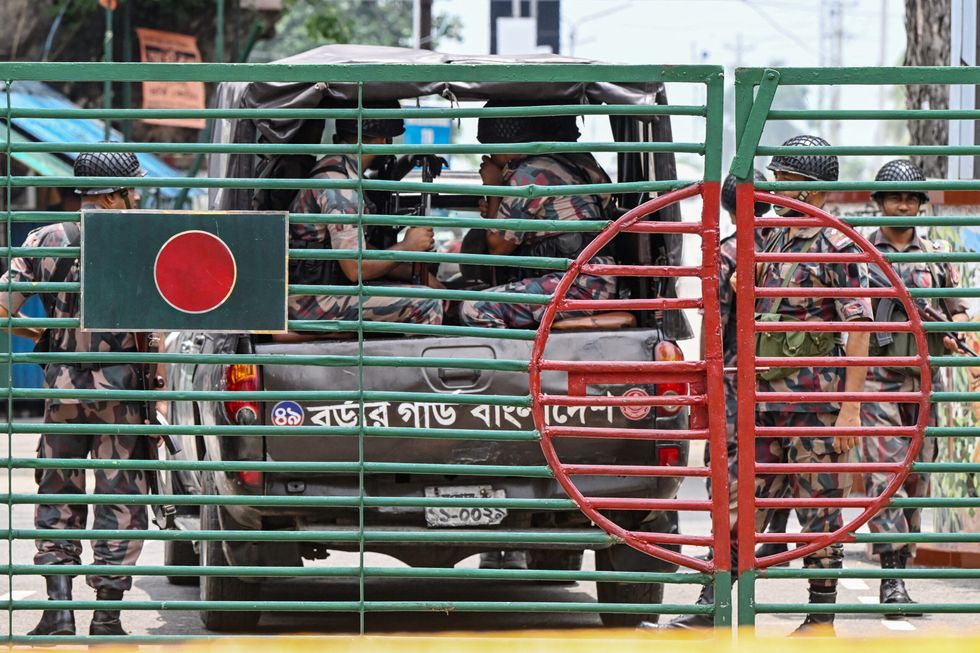NOBEL laureate Muhammad Yunus announced on Tuesday (6) that he is prepared to lead an interim government in Bangladesh after widespread protests forced long-standing leader Sheikh Hasina to leave the country.
"I am honoured by the trust the protesters have placed in me to lead the interim government," Yunus stated in a message to AFP.
He further declared, "If action is needed in Bangladesh, for my country and the bravery of my people, I will take it," adding that he also called for "free elections."
This announcement followed the dissolution of Bangladesh's parliament by president Mohammed Shahabuddin on Tuesday, paving the way for an interim government and new elections. This came just a day after prime minister Sheikh Hasina resigned and fled the country following a violent crackdown on a student-led uprising.
President Mohammed Shahabuddin's office also announced that the leader of the opposition Bangladesh Nationalist Party, Begum Khaleda Zia, a former prime minister who had feuded with Hasina for decades, had been freed from house arrest.
Student protesters had threatened more demonstrations if parliament was not dissolved.
The movement that toppled Hasina rose out of demonstrations against public sector job quotas for families of veterans of Bangladesh's 1971 independence war, seen by critics as a means to reserve jobs for allies of the ruling party.
About 300 people were killed and thousands injured in violence that ripped through the country since July.
After demonstrators stormed and looted the prime minister's lavish residence, the streets of the capital Dhaka were again peaceful on Tuesday, with traffic lighter than usual and many schools and businesses that shut during the unrest still closed.
Students who led the protests were seen directing traffic at major intersections in Dhaka in the absence of police.
"We haven't seen any traffic policemen since yesterday evening. That's why we took the responsibility to control traffic so that everyone can commute smoothly," Mohammad Nur, a 20-year-old college student, told Reuters TV.
Garment factories, which supply apparel to some of world's top brands and are a mainstay of the economy, remained shuttered with plans to reopen to be announced later, the main garment manufacturers association said.
The decision to dissolve parliament was taken following meetings with the heads of armed forces, leaders of political parties, student leaders and some civil society representatives, the presidential statement said.
Hasina's flight ended her 15-year second stint in power in the country of 170 million people, which she had ruled for 20 of the last 30 years at the helm of a political movement inherited from her father, state founder Mujibur Rahman, after he was assassinated in 1975.
Since the early 1990s Hasina had feuded and alternated power with her rival Zia, who inherited her own political movement from her husband Ziaur Rahman, a ruler himself assassinated in 1981.
'Second Liberation day' for Bangladesh after its 1971 war of independence
Protests against Hasina were fueled in part by poverty. After years of strong economic growth as the garment industry expanded, the $450 billion (£353.97bn) economy struggled with costly imports and inflation, and the government had sought a bailout from the International Monetary Fund.
Hasina was accused of becoming increasingly authoritarian, with many of her political foes jailed. Her resignation was greeted by jubilant crowds, who stormed unopposed into the opulent grounds of her residence after she fled on Monday (5), carrying out looted furniture and TVs.
President Shahabuddin had said earlier that an interim government would hold elections soon after it takes over.
Army Chief General Waker-Uz-Zaman was due to meet student leaders to discuss the formation of the government.
Hasina flew to India and is staying at a safe house outside Delhi.
Indian media reported that Hasina may travel to Britain, where she has family including a niece who is a government minister. Reuters could not confirm her plans.
Britain's Home Office declined to comment on Hasina's specific case but said there was no provision in British immigration law allowing someone to travel to Britain to seek asylum.
India's foreign minister Subrahmanyam Jaishankar told parliament that New Delhi had repeatedly "counselled restraint and urged situation to be defused through dialogue".
The student leaders said they want Nobel Peace laureate Muhammad Yunus as the chief adviser to the interim government and a spokesperson for Yunus said he had agreed.
Yunus, 84, and his Grameen Bank won the 2006 Nobel Peace Prize for work to lift mi

llions out of poverty by granting small loans of under $100 (£78.61) to the rural poor of Bangladesh. He was indicted by a court in June on charges of embezzlement that he denied.
He told Indian broadcaster Times Now in a recorded interview that Monday marked the "second liberation day" for Bangladesh after its 1971 war of independence from Pakistan. But he said Bangladeshis were angry with neighbour India for allowing Hasina to land there after fleeing Dhaka.
"India is our best friend...people are angry at India because you are supporting the person who destroyed our lives," Yunus said.
Nahid Islam, a key organiser of the campaign against Hasina, said in a video message: "Any government other than the one we recommended would not be accepted."
The student leaders also said they had received reports of attacks on minority groups including Hindu temples in the Muslim-majority country, and urged restraint as this could undermine their movement.
(With inputs from Reuters and AFP)


















